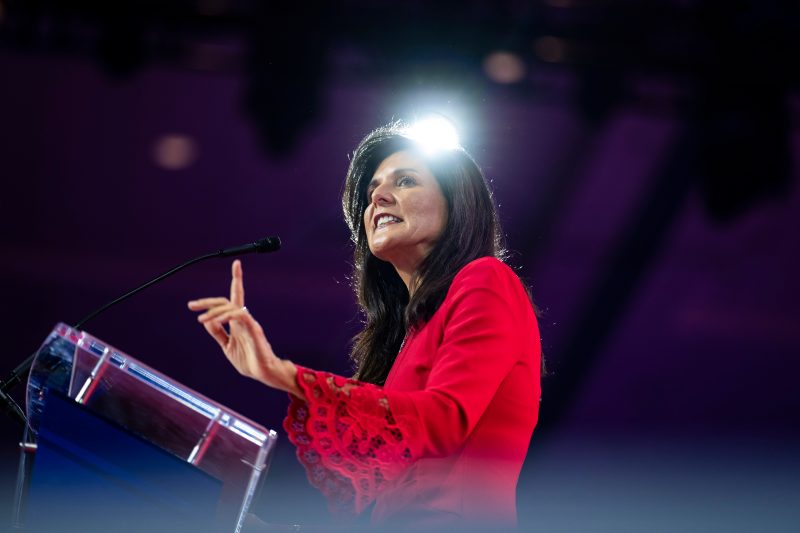Nikki Haley was representing the United States on the world stage, as President Donald Trump’s ambassador to the United Nations, when something closer to home intervened in 2017: a property dispute back in South Carolina.
Bankers were foreclosing on her parents’ lake house, and they were having trouble tracking down the family. They tried the house itself, on the shores of picturesque Lake Murray, as well as Haley’s home in a suburb of Columbia. She was initially named as a defendant in the action.
In vain, they went to Haley’s workplace: the headquarters of the U.S. mission to the United Nations in New York.
“Denied access by U.N. security,” a process server scrawled on an affidavit filed in January 2018.
The foreclosure action, initiated even as Haley served in the highest echelons of government, illustrates the financial pressure she faced as her family’s primary breadwinner during her last stint in public service, which ended when she abruptly quit government later that year and entered the private sector.
In short order, she improved her financial position dramatically, making millions from private consulting, paid speeches and spots on corporate boards. She quickly extricated herself from the lake house proceedings and, in 2019, purchased a $2.4 million property on Kiawah Island — a gated community near Charleston — with arched porticos, columns, balconies and stone balustrades.
Haley’s finances are under a spotlight as she seeks a return to public life, this time as president. A financial disclosure she submitted earlier this year, as required for candidates, shows how she followed a well-worn path to wealth: trading on her government experience, both as U.N. ambassador and, before that, as governor of South Carolina.
The public profile Haley, 51, cultivated as a Republican official — melding deregulatory policies with interventionist and adamantly pro-Israel positions — created lucrative private opportunities. In an 11-month period ending January 2023, she earned about $2.5 million from paid speeches alone, delivered to banks, other businesses and advocacy groups, according to her disclosure. That’s more than she earned in combined salary during the eight years she spent as governor and then a presidential Cabinet member.
Numerous candidates in the GOP field are well-off, including Trump, who also has received generous payments for speeches since leaving office. The specific sources of Haley’s wealth highlight her ties to traditional Republican interests, namely big business and muscular foreign policy. This is political fodder for her opponents, as tides of populism and isolationism rip through the party. At a recent debate, the entrepreneur Vivek Ramaswamy criticized her for giving “foreign multinational speeches like Hillary Clinton.”
In response to questions about Haley’s finances, her campaign said in a statement: “These are old claims answered long ago and re-upped by the liberal media because Nikki is surging. Democrats fear Nikki the most because poll after poll shows she would trounce Joe Biden in a head-to-head matchup.”
A Haley spokesperson said the campaign does not have transcripts of Haley’s paid speeches because most took the form of question-and-answer sessions. Haley also has not released her recent tax returns. The spokesperson said she intends to but did not respond to questions about when.
In 2016, Haley condemned Trump for withholding such documents. “Donald Trump, show us your tax returns!” she said at the time. And she took a swipe at Hillary Clinton, the Democratic nominee for president, who had come under criticism for refusing to reveal the contents of her paid speeches. “We have two presidential candidates that refuse to disclose information: Hillary Clinton and Donald Trump,” she said.
Haley’s reversal of fortune sheds light on inconsistencies between her public posturing and personal finances. She has touted her background in accounting yet faced penalties for failing to pay taxes on time, according to state records and news reports. She has demanded transparency from political adversaries yet veiled some aspects of her own sudden wealth while not always maintaining bright lines between her public role and private life.
After she left the U.N., government investigators found that seven private flights she had accepted while in office risked the “appearance of a conflict of interest,” though they did not violate executive branch gift rules, according to documents obtained by The Washington Post. The finding has not previously been reported.
Longtime associates say Haley’s finances are bound up with her family story. After watching her immigrant parents work nonstop, and supporting them financially when they stumbled, she resolved to use her stature and relationships to make sure she was on firmer footing.
“She rubbed shoulders with many of these corporate folks, and she took that and decided to monetize it, because that’s what people in government who are popular do,” said Hal Stevenson, a South Carolina businessman and former board member of a nonprofit founded by Haley. “I think she had this sense of, ‘I’ve got this window to make some money and take care of my kids.’”
As she rose politically, Haley often emphasized her background as an accountant.
She traces her financial acumen to her teenage years, when she prepared the taxes and wrote checks for her mother’s business in Bamberg, a small city southeast of Columbia where Haley’s parents, immigrants from India, settled in the late 1960s.
“I developed a huge love of numbers,” she wrote of her work at the business in a 2012 autobiography. “When the store’s books were off by two cents, I loved finding those two cents.”
She studied accounting at Clemson University and worked for a recycling company in Charlotte before returning to the family business, called Exotica International, a gift shop that grew into an international clothing emporium. Haley wrote that she handled accounting, budgeting, marketing and sales reports for the burgeoning operation, which, according to promotional materials for the business, eventually relocated to a 10,000-square-foot facility in Columbia, the state capital. Her husband, Michael Haley, worked as the menswear manager for a time.
Exotica International closed its doors in 2008. But it became a headache for Haley during her first bid for governor of South Carolina, in 2010. Records show the company was penalized on numerous occasions for failing to pay taxes.
When the tax delinquencies came to light, Haley blamed the tax system and vowed to simplify it as governor. Years after the company’s closure, however, it was still facing fines for tax problems, according to a lien filed in 2013. Haley and her husband also faced fines for paying their own taxes late, at least twice filing more than 14 months behind schedule, according to records she released during the 2010 campaign.
The pattern provided fodder to her Democratic opponent, Vincent Sheheen, whose campaign argued, “Every time she touches a balance sheet, she leaves behind a trail of tax liens and penalties.” Haley acknowledged the penalties at the time, saying, “We saw incomes ups and downs.”
The issue didn’t sway voters, who elected Haley in 2010 and reelected her four years later. In the governor’s office, she cultivated a pro-business reputation, welcoming a wide range of industry, including a Singaporean tire company and a Chinese fiberglass company, to South Carolina. In 2013, she championed $120 million in taxpayer-backed incentives to help aerospace giant Boeing expand in North Charleston.
She continued to live relatively modestly by the standards of a state’s chief executive. She and her husband, a businessman and Army National Guardsman, made just under $200,000 in 2014, including her state salary of about $106,000, according to tax returns released in line with gubernatorial custom. Their income fell the following year to about $170,000, as Haley’s husband transitioned to a part-time role with the reserve force. They had two teenage children.
In 2016, Trump chose her as his U.N. ambassador, which came as a surprise, according to Haley. In her 2019 memoir, she recalls telling the president-elect’s team, “I don’t even know what the United Nations does!”
Haley moved to New York and soon learned that life at the U.N. demanded a tight schedule. So for trips back home to South Carolina, she sometimes leaned on affluent friends.
Among those friends was Jimmy Gibbs, whose industrial machinery and commercial real estate business provided a plane for Haley and her husband four times in 2017, according to a financial disclosure form she filed as a top executive branch official.
The following year, Gibbs met with Haley’s chief of staff and other U.S. officials to discuss how his company “could help at the U.N. and in other countries,” according to a previously unreported probe into the flights by the State Department’s Office of Inspector General in 2019.
Soon after the meeting, Gibbs’s company was placed on a State Department list of entities seeking to do business with the government, the probe found. The inspector general’s report found that Haley learned of Gibbs’s planned session with her staff the day before it took place.
The events concerned ethics officials, according to the report. Upon learning of the meeting, one official wrote in an email that “these interactions call into question whether the gift was given based on a personal friendship rather than because of Ambassador Haley’s position and the opportunity for access at USUN,” referring to the U.S. mission to the United Nations.
Haley told the inspector general’s office that her staff had consulted with the State Department’s Office of the Legal Adviser before accepting the flights. Other officials clarified that approval had only been sought for the first flight, not the subsequent ones.
The inspector general’s office found that Haley had not violated the government’s gift regulations because she had shown that Gibbs and others who had bestowed flights were her personal friends. Federal rules permit gifts from family and friends but state that employees should decline if “a reasonable person with knowledge of the relevant facts would question the employee’s integrity.”
The inspector general’s office concluded that if Haley were still serving, the office would advise against accepting similar flights “to prevent the appearance of a conflict of interest,” especially given that Gibbs’s company sought to do business with the department.
Haley’s campaign responded to questions about the flights by stating that “no policy was violated.” Gibbs did not respond to a request for comment.
The flights he provided brought Haley to South Carolina for various reasons. In June 2017, she sat for an interview about the 2015 shooting at a historic Black church in Charleston. In November, she attended a Clemson football game.
The same month as the football game, Haley had another reason to turn her gaze back home to South Carolina: Bank of America was beginning foreclosure proceedings on her parents’ lake house in Lexington, a suburb of Columbia.
Haley and her husband were named as defendants in the suit because the property was used as collateral when the couple loaned Haley’s parents $400,000 several years earlier.
In mid-November, the bank attempted to deliver court papers at the U.S. Mission to the United Nations, according to an affidavit submitted the following January. By June 2018, Haley and her husband had relinquished interest in the house and were removed as defendants. The court ordered a sale of the property the following spring.
Meanwhile, a complex set of transactions allowed Haley and her husband to take other steps to help her parents financially. That included purchasing the strip mall that once housed the family clothing business — for $5 and “love and affection,” even though more than $1 million of debt came with the property — and then selling it off to a local real estate developer, deeds and other records show.
In response to questions about family property, a Haley spokesperson said only, “This has been litigated repeatedly.”
“There were financial troubles toward the end,” said Stevenson, the South Carolina businessman and longtime Haley associate, who got to know the family when he arranged advertising for their company in its early days. Haley, he said, “was there to support her parents.”
Haley and her husband were hardly flush with cash. A financial disclosure she filed in her final year at the U.N. in 2018 shows they had as much as $65,000 in credit card debt and two mortgages totaling about $1.5 million, along with a line of credit of between $250,000 and $500,000. Haley was earning less than $200,000 as U.N. ambassador, and her husband was making no more than $100,000 from his company, Ikor Systems, according to the filing.
Because the figures are disclosed in ranges, a more detailed analysis of Haley’s finances is not possible.
But not long after, Haley made sudden changes that allowed her to increase her earnings. In October 2018, she announced that she would leave government at the end of the year.
In her resignation letter, she addressed Trump “as a businessman” and told him, “I expect you will appreciate my sense that returning from government to the private sector is not a step down but a step up.”
The private sector proved lucrative for Haley.
She quickly joined the board of Boeing, earning more than $250,000 in fees and stock awards in 2019, according to a company filing with the Securities and Exchange Commission. At the time of Haley’s selection, Boeing’s chairman and chief executive praised her “outstanding record of achievement in government.’
A person who served on the board with her, and spoke on the condition of anonymity to discuss private corporate matters, said she was a valuable asset not only because of her support for Boeing when she was governor of South Carolina but also because of her time at the United Nations. The aerospace manufacturer generates 80 percent of its commercial airplane revenue overseas.
Haley quit the board in the spring of 2020, as the coronavirus began to send shocks through the economy. In a letter to company leaders included in a regulatory filing, Haley, who seven years earlier had granted generous bond money to Boeing for its expansion in South Carolina, said she disagreed with the company’s “move to lean on the federal government for a stimulus or bailout that prioritizes our company over others and relies on taxpayers to guarantee our financial position.”
The company had issued a statement advocating government support for the aerospace industry, though it ended up not seeking a bailout.
Haley soon found other opportunities, joining the board of Great Southern Homes, a major home builder in the Southeast. And she began advising a venture fund called Prism Global Management. The fund has no website and indicated on an SEC filing that its principal place of business is a private residence. But it paid Haley more than $700,000 in 2022 and the first part of this year, according to Haley’s candidate disclosure.
A notice about Prism Global’s launch, in an email newsletter devoted to hedge fund activity, said the fund was expected to begin trading with about $1 billion, focusing on technology, media and communications in the United States and abroad. A person who has worked with Prism’s founder and chief executive, investor Richard Kang, said the fund’s goal is to finance companies that compete with China, lessening its influence. A spokesman for Prism Global confirmed these details.
On her disclosure, Haley described herself as a “senior advisor” to the fund. When an attendee at a recent town hall in Iowa asked her about that work, she touted her experience in foreign affairs. “And so what they do is they ask me anything that’s going on, for example, they’ll ask me what’s going on in the Middle East,” she said. ‘Or they’ll ask me what I think about China. The big thing with Prism Global is they want to make sure that companies stop investing in China.”
Haley has traveled widely in recent months sharing her thoughts with global audiences. She delivered a dozen speeches between March 2022 and January 2023 for which she was generally paid $185,000 per engagement, according to her candidate disclosure.
But her fees sometimes went higher, including the $346,000 she earned from the Mount Scopus College Foundation, which funds a Jewish day school in Melbourne, Australia. The foundation’s CEO did not respond to a request for comment, but its website states that, during Haley’s visit last year, she “answered students’ questions on topics ranging from her work at the U.N., leadership advice to young women, and the war in Ukraine, to her time as a member of President Trump’s cabinet.”
Haley’s staunch defense of Israel at the United Nations has made her a popular guest for pro-Israel groups. Shimon Fogel, chief executive of the Centre for Israel and Jewish Affairs in Canada, said she spoke about global affairs and confronting antisemitism in an appearance last December, which earned her $230,000.
“She is much admired in the Jewish community for obvious reasons — and not in an especially partisan way,” Fogel added. “For us, it was a very worthwhile initiative.”
Other common audiences include banks, in locations as disparate as Chicago and Singapore, and health care, industrial and aerospace companies throughout the United States. She twice addressed subsidiaries of Barclays, the British banking giant. A bank spokesman declined to comment.
Haley didn’t accept an honorarium for all appearances. She waived the speaker’s fee when she was the guest of honor a 2019 gala hosted by UN Watch, a monitoring group that’s often critical of the United Nations, including for what it sees as anti-Israel bias within the organization.
Instead, an American branch of the watchdog group made a $50,000 donation to a charity of Haley’s choice, and she opted for her own nonprofit, called the Original Six Foundation, according to a UN Watch spokesman. Formed by Haley in 2011, the Original Six Foundation took its name from the original six members of Haley’s family, her parents and their four children. As a nonprofit, the group isn’t required to disclose its donors, but has sometimes thanked individual sponsors, such as Boeing.
According to tax filings, the foundation’s goal is to improve rural education and after-school programs in South Carolina. But during her time at the United Nations, its fundraising dwindled to less than $100,000. It has since rebounded to more than $500,000 in annual revenue, just as Haley’s personal fortune has increased.
The insights Haley gained on the world stage have a high market value, said Patrick McKinney, a former real estate developer on South Carolina’s Kiawah Island who has known Haley since her 2010 gubernatorial campaign and once served on her foundation’s board.
“People want to understand things from her perspective,” he said. “And they’re willing to pay for it.”
Alice Crites contributed to this report.



























